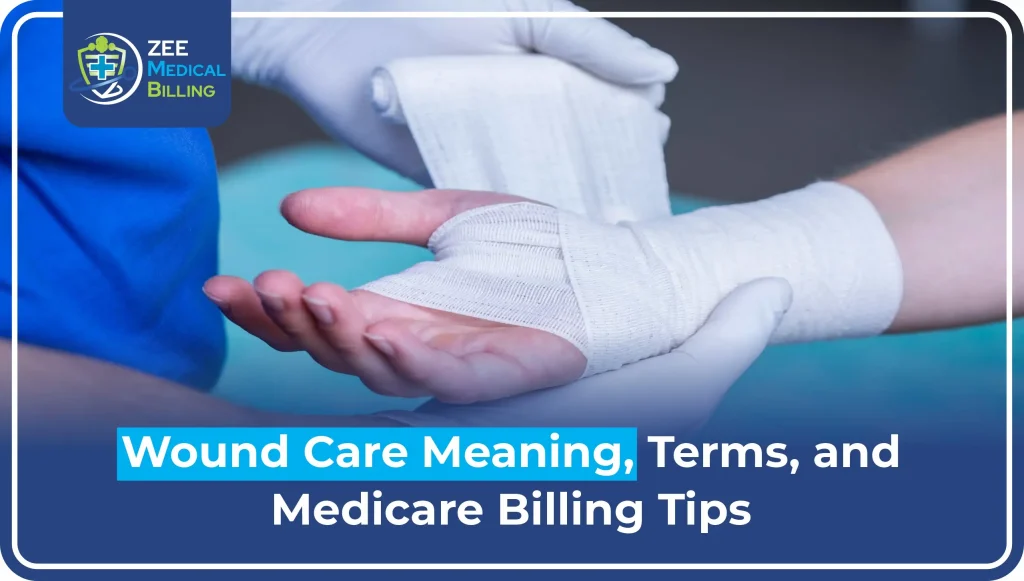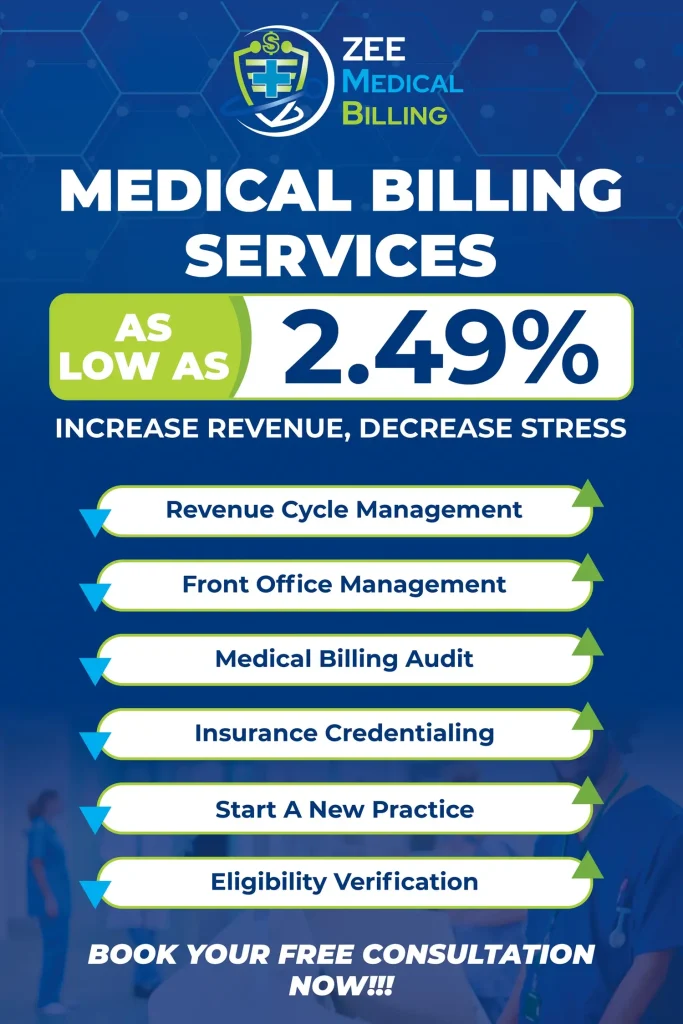Wound care is an important part of healthcare. Especially vital for patients with chronic wounds, healing after surgery, or injuries needing special care. As people get older and more have chronic conditions like diabetes, good wound care is crucial. Proper billing practices are also essential.
This article explains what wound care means. It covers common terms used in wound care. It also gives helpful tips on Medicare wound care billing guidelines. All this is in simple, easy-to-understand language.
What Is Wound Care? A Simple Explanation
If you’re wondering what is wound care? You’re not alone.
Wound care refers to the process of treating, managing, and promoting healing in damaged skin or tissue. This includes cleaning the wound, putting on dressings, and preventing infection. Sometimes, healthcare providers use advanced treatments like negative pressure wound therapy or debridement.
Read More: Understanding Ambulatory Medical Services in Medical Billing
Wound Care Definition
Wound care is a special medical method. It treats both new and long-lasting wounds. The goal is to help wounds heal well. This also helps prevent problems like infection, tissue damage, or scarring.
Why Is Wound Care Important?
Understanding the importance of wound care goes beyond healing a cut. Poorly managed wounds can lead to infections, hospitalizations, and even amputations. Proper wound care helps:
- Reduce infection risk
- Promote faster healing
- Improve patient comfort
- Minimize hospital visits and costs
Wound Care Terminology You Should Know
Learning wound care terms can help patients and providers communicate more effectively. Here are some of the most common terms you’ll come across:
Common Wound Care Terms
- Debridement: The removal of dead or infected tissue to promote healing.
- Granulation Tissue: New tissue formed during wound healing.
- Exudate: Fluid produced by the wound that may contain infection-fighting cells.
- Pressure Ulcers: Also known as bedsores, caused by prolonged pressure on the skin.
- Epithelialization: The regrowth of skin over a wound.
Having a good grasp of wound care terminology is essential for accurate documentation and billing.
What Is a Wound Care Clinic?
A wound care clinic is a specialized healthcare facility that provides focused care for complex or slow-healing wounds. These clinics often use a team-based approach involving doctors, nurses, and specialists trained in wound management. Patients may visit a wound care clinic for:
- Diabetic foot ulcers
- Surgical wounds
- Pressure injuries
- Burns or traumatic injuries
Wound Care Billing: A Basic Overview
Wound care billing refers to the process of documenting and submitting claims for reimbursement for wound treatment services. It requires careful attention to detail to ensure accurate coding, compliance with Medicare guidelines, and proper reimbursement.
Medicare Wound Care Billing Guidelines
Medicare has specific requirements for wound care medical billing, particularly regarding:
- Medical necessity: The service must be deemed medically necessary
- Documentation: Clinical notes must support the treatment provided
- Frequency limits: Certain services have limits on how often they can be billed
- Correct CPT/HCPCS codes: Procedures like debridement have specific codes
Understanding these Medicare wound care billing guidelines is crucial to reduce claim denials and ensure compliance.
Tips for Compliant Medicare Wound Care Billing
- Document thoroughly: Include wound size, depth, treatment method, and progress.
- Use proper codes: Choose codes that reflect the service performed.
- Check frequency limits: Know how often Medicare allows billing for certain wound care services.
- Stay up-to-date: Medicare rules change frequently — keeping current helps prevent billing issues.
Outsourcing Wound Care Billing: Is It Worth It?
Managing billing in-house can be time-consuming and error-prone. Many healthcare providers choose to outsource wound care medical billing services to ensure accuracy and focus on patient care.
Zee Medical Billing provides custom billing solutions. These solutions help wound care providers manage complex billing needs. This support reduces stress in their workflow. Whether you’re a small practice or a growing wound care clinic, outsourcing can provide:
- Reduced administrative burden
- Improved claim approval rates
- Timely reimbursement
- Compliance with Medicare and insurance policies
If you are in Washington or anywhere in the U.S., think about outsourcing your wound care billing. Choose a company that knows the details of wound care billing, like Zee Medical Billing.
Read More: What are Prior and Retro Authorizations in Medical Billing?
Common Mistakes in Wound Care Billing
Avoid these frequent errors to improve your wound care billing process:
- Incorrect coding: Using outdated or wrong procedure codes
- Incomplete documentation: Missing wound details or treatment notes
- Overlooking frequency rules: Billing too often for services
- Ignoring LCD/NCD guidelines: Not following Medicare coverage policies
FAQs
1. What is wound care in medical terms?
Wound care is the medical treatment of skin or tissue injuries. It aims to help heal and prevent problems like infection or long-term inflammation.
2. How does wound care billing work under Medicare?
Medicare requires documentation of medical necessity, appropriate coding, and adherence to frequency and coverage guidelines.
3. What’s the difference between standard and advanced wound care?
Standard wound care includes basic cleaning and dressing. Advanced wound care may involve debridement, grafts, or bioengineered skin substitutes.
4. Why is accurate wound care documentation important for billing?
Accurate notes support the services billed, help meet Medicare’s requirements, and prevent delays or denials.
5. Can wound care clinics outsource their billing?
Yes. Clinics often benefit from outsourcing wound care billing to reduce errors, save time, and get paid faster.
Conclusion
Understanding wound care is important. Crucial for healthcare providers, billing teams, and administrators. Knowing how wound care billing works is also essential. From accurate documentation and coding to following Medicare wound care billing guidelines, every detail matters.
For providers who want to work better, reduce denials, and simplify billing, Zee Medical Billing can help. They offer reliable support for managing your wound care billing process. We have experience, precision, and compliance at our core. We help healthcare professionals focus more on healing and less on paperwork.
Need Expert Medical Billing Services?
Zee Medical Billing provides professional billing solutions tailored to healthcare providers across the United States. In addition to offering top-tier support from our main office, we proudly serve clients in Illinois, Indiana, California, Kentucky, New York, Washington, Georgia, Alabama, South Carolina, Texas, Pennsylvania, Ohio, New Hampshire, Nevada, Massachusetts, Hawaii, Arizona, and Colorado! Whether you’re looking to streamline your revenue cycle or improve claims accuracy, you can reach out to us to learn more about how we can support your practice.









